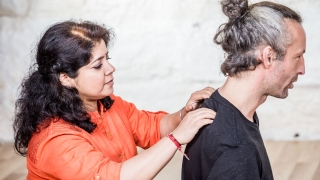
The story of the ultimate Mantra
Gayatri Mantra is commonly sung in Kirtans, known as Japa Mantra, and often meditated upon. Have you ever wondered what is the story of this mantra?

![]() 2 minutes
2 minutes
You might have practiced bandhas or Mulabandha and came across various techniques of contraction, concentration, with and without pranayama.
Is it all about contraction? Is it only about the physical level?
To start with, let's clarify that mulabandha is the practice of redirection. It is not just a contraction or hold at the physical level.
In everyday life, when we make choices out of need not greed, when we moderate instead of indulging in sensory pleasures, these are practical applications of Mulabandha.
It is much easier to learn how to isolate a tissue and contract it versus how to discern making a rightful choice.
Mulabandha (Root Lock) is the grounds upon which we stand and the roots that keep up stable. These grounds have to be contentment with who and where we are. It does not mean to not have passion for growth but implies to have contentment with failures and sadness also.
When passion is rooted in contentment that is mulabandha.
The energy rises like the roaring of a lion and the hissing of a fierce snake, piercing through our weaknesses and transforming them as strengths.
Read more on Bandhas
May we be established in that Mulabandha!
STAY IN TOUCH
Start your FREE subscription to Indu Arora's newsletter to get more on Yoga and Ayurveda here
Say hello on Instagram
Subscribe to my Youtube Channel.

Gayatri Mantra is commonly sung in Kirtans, known as Japa Mantra, and often meditated upon. Have you ever wondered what is the story of this mantra?

Indu talks about the Ayurvedic healing modality of Marma Therapy for cleansing blocked energy, and how it can help on your healing journey. In conversation with Dr. Avanti Kumar Singh. The Healing Catalyst podcast

Did you know that the sacred swan (known as hamsa in Sanskrit) is the ride of Devi Saraswati, the Goddess of wisdom? Every year, 40 days before the arrival of spring on the 5th day (panchami) after the new moon marks the day of festivities in anticipation of Spring (Basant).